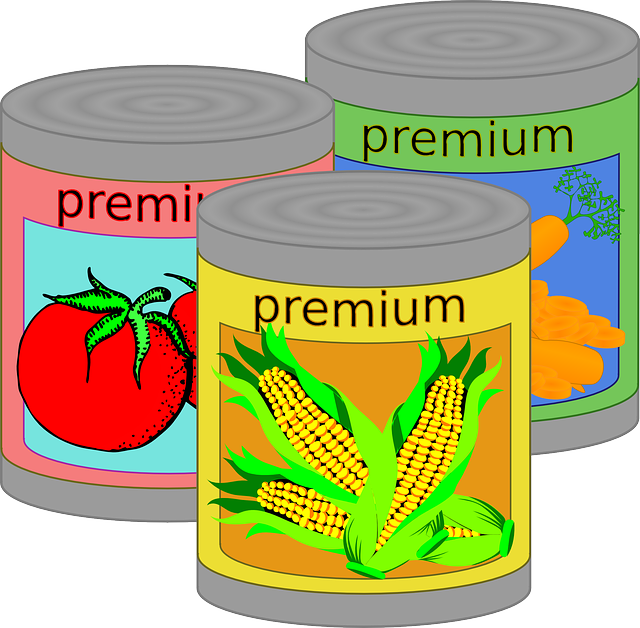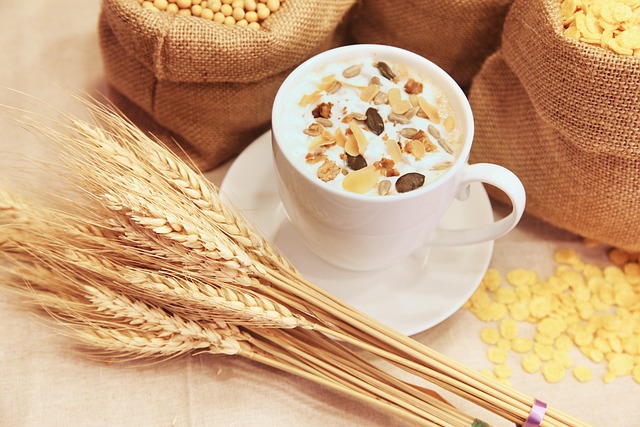Canned goat milk represents a sustainable and healthful alternative to traditional cow's milk, particularly for those with dairy sensitivities or dietary restrictions. Its higher levels of medium-chain triglycerides, lower lactose content, and richer vitamin and mineral profiles make it an appealing option within the 'weird canned food' niche. The environmental benefits of cans over other packaging options contribute to its sustainability, and its shelf-stable nature reduces waste and energy consumption. Its unique flavor profile offers a tangy yet creamy taste that is versatile enough for both hot and cold beverages, as well as in cooking, making it a convenient and nutritious addition to any diet. As it gains popularity, canned goat milk stands out as an innovative choice for health-conscious consumers looking to explore beyond conventional dairy products.
Exploring the latest trends in alternative dairy options, this article delves into the emerging phenomenon of goat milk in a can. As the market for unconventional canned goods expands beyond the traditional, consumers are discovering the unique advantages of goat milk. From its nutritional distinctiveness to its eco-friendly production process, this beverage is carving out a niche in the dairy aisle. We’ll navigate the benefits, taste experience, and practical aspects of incorporating canned goat milk into your diet, making it a compelling choice for those interested in the weird canned food space. Join us as we examine the rise of this unusual yet sustainable dairy option that’s gaining popularity among health-conscious and adventurous consumers alike.
- The Rise of Unconventional Canned Goods: A Look at Goat Milk in the Marketplace
- Understanding the Unusual Choice: The Benefits and Characteristics of Goat Milk
- From Farm to Can: The Process of Canning Goat Milk
- Nutritional Profile: How Goat Milk Stands Out from Cow's Milk
- The Sustainability Argument: Is Canned Goat Milk Eco-Friendly?
- Taste Test: The Flavor Experience of Canned Goat Milk
- Where to Buy and How to Enjoy: Incorporating Canned Goat Milk into Your Diet
The Rise of Unconventional Canned Goods: A Look at Goat Milk in the Marketplace

The marketplace for canned goods has seen a surge in the popularity of unconventional items, with goat milk emerging as a standout choice among health-conscious consumers. This trend towards ‘weird canned food’ reflects a broader shift in dietary preferences, where buyers are increasingly seeking out products that offer unique health benefits and a departure from the mainstream dairy options. Goat milk, with its naturally homogenized structure, is gaining attention for its digestibility and nutritional profile, which includes being easier to tolerate for individuals with cow’s milk sensitivities. Its mild flavor and potential allergy-mitigating properties are making it a preferred alternative for those looking to diversify their dietary intake or explore new culinary possibilities.
The rise of canned goat milk represents an intriguing intersection between convenience, sustainability, and health. Unlike fresh goat milk which has a shorter shelf life, canning preserves the nutritional integrity of the product without the need for refrigeration. This makes it an ideal option for both urban dwellers with limited storage space and those in remote areas where fresh dairy products are scarce. Moreover, the innovation behind canned goat milk is aligning with a growing environmental consciousness, as its shelf-stable nature reduces waste associated with packaging and spoilage. As a result, this niche market within the ‘weird canned food’ category is poised to expand, catering to an audience that values both the health benefits of goat milk and the sustainability of its packaging.
Understanding the Unusual Choice: The Benefits and Characteristics of Goat Milk

Goat milk, an ancient sustenance staple, has made a modern resurgence in the realm of beverages and now comes in a can, offering a surprising addition to the market of weird canned food. This dairy alternative is gaining traction among consumers who seek lactose-tolerant options or a change from traditional cow’s milk. It boasts a naturally homogenized fat distribution, which makes it easier to digest and gentler on the stomach for many individuals. The unique properties of goat milk stem from its composition; it contains shorter-chain fatty acids similar to breast milk, making it more akin to human nutrition than cow’s milk. This resemblance can be beneficial for those with sensitivities to cow’s milk proteins. Moreover, goat milk is rich in vitamins and minerals, including calcium, potassium, and niacin, and it has been traditionally used to aid in digestive health due to its prebiotic properties. Its rich taste, often described as more “creamy” and less “heavy” than cow’s milk, adds a new dimension to the selection of weird canned food choices available today. As consumers become more adventurous and health-conscious, goat milk in a can emerges not just as a novelty but as a viable and nutritious option for daily consumption.
From Farm to Can: The Process of Canning Goat Milk

In the realm of alternative dairy options, goat milk stands out for its unique taste and nutritional profile, gaining popularity among consumers seeking healthier and more sustainable choices, which contrasts with the notion of ‘weird canned food.’ The journey of goat milk from farm to can is a meticulous process that prioritizes hygiene, quality, and shelf-life. Small-scale and large-scale producers alike adhere to strict guidelines to ensure the purity and safety of this nutrient-dense beverage. Starting on the farm, goats are cared for in environments that promote their well-being and milk production. Once milked, the goat milk undergoes an initial pasteurization process to eliminate any potential pathogens, preserving its natural benefits while extending its shelf-life beyond what fresh milk typically offers.
After pasteurization, the milk is quickly cooled to prevent bacterial growth and then transferred to aseptic processing facilities. These state-of-the-art plants are designed to maintain the integrity of the milk as it moves through the various stages of canning. The goat milk is then homogenized, ensuring a consistent texture and preventing the cream from separating during storage. Subsequently, it is carefully filled into cans under high pressure to eliminate any air pockets and minimize oxidation, which could alter the taste or compromise the quality. The cans are then sealed with advanced machinery that creates an impermeable barrier to protect the milk from external contaminants while allowing it to mature in flavor without the need for refrigeration. This innovative canning process allows consumers to enjoy fresh, high-quality goat milk directly from the can, defying the stereotype of ‘weird canned food’ and offering a convenient, long-lasting alternative to traditional dairy products.
Nutritional Profile: How Goat Milk Stands Out from Cow's Milk

Goat milk, a beverage with ancient roots, has garnered modern interest as an alternative to cow’s milk, particularly among consumers seeking dietary diversification or those sensitive to cow’s milk proteins. Canned goat milk emerges as an intriguing entry in the realm of ‘weird canned food,’ yet it boasts a nutritional profile that sets it apart from its bovine counterpart. Goat milk contains shorter-chain fatty acids, capric and caprylic acid, which are easier to digest and can be tolerated better by individuals with cow’s milk intolerance. It also has a higher proportion of medium-chain triglycerides, which may support metabolic health. In terms of protein content, goat milk offers proteins in a form that is often more compatible with human digestion than cow’s milk proteins. This can be particularly beneficial for those with dairy sensitivities or allergies. Furthermore, goat milk provides a unique balance of vitamins and minerals, including higher levels of calcium and Vitamin A compared to cow’s milk when adjusted for fat content. Its lower lactose content, relative to cow’s milk, makes it a compelling choice for lactose-intolerant consumers who still wish to enjoy the benefits of liquid dairy. The availability of goat milk in cans extends its shelf life and convenience, making it a sustainable and portable option among the niche of ‘weird canned food,’ while still offering a nutrient-dense alternative to traditional cow’s milk.
The Sustainability Argument: Is Canned Goat Milk Eco-Friendly?

The emergence of canned goat milk as a sustainable alternative in the realm of dairy beverages has sparked conversations about its environmental impact. Proponents argue that this format offers several eco-friendly advantages over traditional packaging. Unlike cartons, which require significant energy to produce and transport, cans are recyclable and have a lower carbon footprint due to their durability and lighter weight when empty. This makes them a viable option for those prioritizing sustainability in their dietary choices. Moreover, the goats producing this milk often graze on lands unsuitable for crop cultivation, thus promoting biodiversity and reducing the need for fertilizers and pesticides that can harm ecosystems. The closed loop recycling nature of aluminum cans also contributes to a smaller environmental footprint compared to other packaging methods.
Canned goat milk’s sustainability argument extends beyond its production and distribution stages. Its shelf-stability allows for a reduced reliance on refrigeration, which can consume considerable energy, further contributing to lower greenhouse gas emissions. Additionally, the product’s long shelf life reduces waste often associated with spoilage in perishable goods. However, the sustainability of canned goat milk also depends on the practices of the dairy farms supplying the milk. Ethical and environmentally responsible farming practices are crucial for maintaining the eco-friendly narrative of canned goat milk. Consumers interested in the environmental benefits should consider investigating the sourcing and practices of the brands they support, ensuring that their choice aligns with a genuine commitment to sustainability within the industry. The ‘weird canned food’ phenomenon, as it’s sometimes called, not only challenges conventional perceptions but also offers a potentially more sustainable option in the dairy category.
Taste Test: The Flavor Experience of Canned Goat Milk

The flavor experience of canned goat milk presents a unique proposition in the realm of dairy alternatives, offering a taste that stands apart from its cow’s milk counterpart and other weird canned food options. Upon opening a can, the aroma is often subtle yet distinct, hinting at a natural, earthy scent that is characteristic of goat’s milk. This initial whiff sets the stage for what is an uncommonly smooth and creamy texture upon consumption. The taste is typically described as being slightly tangier than cow’s milk, with a fresher, cleaner finish. This tanginess is not overpowering but rather enhances the overall flavor profile, making it a versatile choice for both hot and cold beverages or as a direct substitute in recipes that call for milk. The canning process preserves the inherent qualities of goat’s milk, ensuring that its unique attributes remain intact from the first sip to the last, offering a convenient yet authentic experience that deviates from the traditional glass bottle or fresh carton.
Where to Buy and How to Enjoy: Incorporating Canned Goat Milk into Your Diet

Goat milk in a can has emerged as an intriguing alternative to traditional cow’s milk and other dairy products, catering to those with dietary sensitivities or simply seeking new flavors. This unique beverage is gaining popularity due to its numerous health benefits and distinct taste. Canned goat milk is readily available at health food stores, specialty grocery shops, and online retailers. When shopping for canned goat milk, look for reputable brands that prioritize quality and organic practices to ensure the freshest and purest product.
Incorporating canned goat milk into your diet offers versatile culinary possibilities. It can be a direct substitute in recipes calling for cow’s milk, from smoothies and teas to soups and sauces. The convenience of having goat milk in a can eliminates the need for refrigeration, making it an excellent pantry staple. Additionally, its rich and creamy texture makes it a perfect addition to coffee or cereal, providing a delightful twist to your morning routine. For those intrigued by the concept of weird canned foods but new to goat milk, consider starting with savory dishes that utilize its slightly tangy flavor profile. Experimenting with canned goat milk in place of cow’s milk in recipes for dressings, marinades, or even as a cream substitute in pasta dishes can introduce you to its subtle yet distinctive character. With its growing availability and the ease of use, canned goat milk is an exciting addition to any kitchen, offering a world of culinary exploration beyond the conventional dairy offerings.






